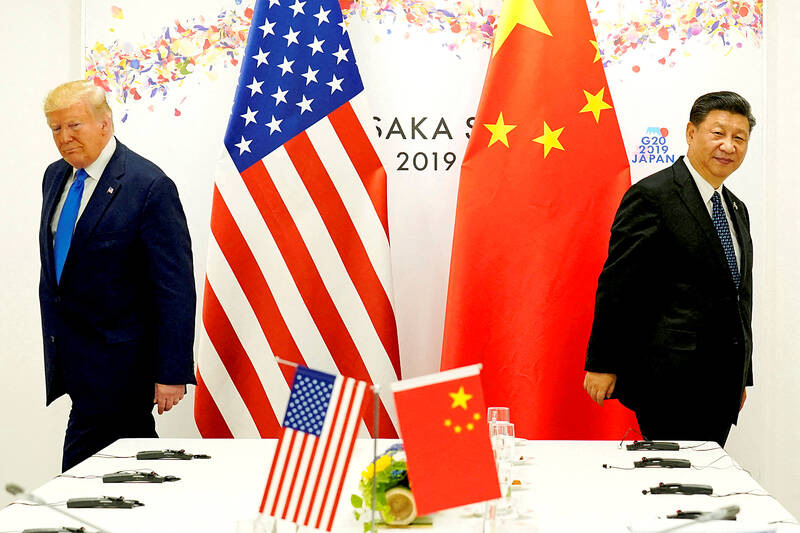US President Donald Trump’s administration is weighing export restrictions against China that would bar the purchase of a wide swath of critical software, a White House official said on Wednesday on condition of anonymity.
Reuters earlier reported that the US was weighing efforts similar to the curbs implemented against Russia following the invasion of Ukraine if China did not backtrack from its threat to restrict rare earth exports.
Asked about limits on software exports to China, US Secretary of the Treasury Scott Bessent said that “everything is on the table.”

Photo: Reuters
“If these export controls, whether it’s software, engines or other things happen, it will likely be in coordination with our G7 allies,” Bessent said.
The Reuters report did not detail specific curbs or a definitive timeline for the new measures to be announced, but the US implemented export controls on enterprise resource planning, customer relationship management and computer-aided design software against Russia over the past few years.
Beijing and Washington have adopted a pattern of floating trade measures ahead of negotiations, providing leverage and bargaining chips for talks aimed at reducing barriers between the world’s largest economies.
Earlier this month, Trump said he would impose an additional 100 percent tariff on China as well as export controls on “any and all critical software” beginning at the start of next month.
The US has said that the move is in retaliation for China’s announced restrictions on the flow of critical rare earth minerals needed to make consumer products including motors, semiconductors and fighter jets, as well as new port fees on US ships.
Trump also threatened more retaliation earlier this week against Beijing if the two sides were unable to broker a deal.
However, he also said that talks planned for next week with Chinese President Xi Jinping (習近平) would produce a “good deal” on trade.
Trump said he expected to have a “pretty long meeting” with Xi and to “work out a lot of our questions and our doubts and our tremendous assets together.”
“I think something will work out. We have a very good relationship, but that’ll be a big one,” he added.
Bloomberg Economics geoeconomics technology analyst Michael Deng said that the software restrictions would be possible under export control rules, but would be difficult to execute, given that the government department that would carry them out, the US Bureau of Industry and Security, has limited capacity and already strained licensing system.
A ban on “critical software” would mean greater risk for the sales in China of Cadence Design Systems Inc, Dassault Systemes SA and Synopsys Inc, Bloomberg Intelligence senior tech industry analyst Niraj Patel said.
Other areas that could be labeled as critical include Nvidia Corp’s CUDA toolkits, OpenAI’s artificial intelligence platforms, Arm Holdings PLC’s firmware tools and Qualcomm Inc’s telecom, as well as cryptography or encryption software by NXP Semiconductors NV and Palo Alto Networks Inc, Patel said.

Micron Memory Taiwan Co (台灣美光), a subsidiary of US memorychip maker Micron Technology Inc, has been granted a NT$4.7 billion (US$149.5 million) subsidy under the Ministry of Economic Affairs A+ Corporate Innovation and R&D Enhancement program, the ministry said yesterday. The US memorychip maker’s program aims to back the development of high-performance and high-bandwidth memory chips with a total budget of NT$11.75 billion, the ministry said. Aside from the government funding, Micron is to inject the remaining investment of NT$7.06 billion as the company applied to participate the government’s Global Innovation Partnership Program to deepen technology cooperation, a ministry official told the

Taiwan Semiconductor Manufacturing Co (TSMC, 台積電), the world’s leading advanced chipmaker, officially began volume production of its 2-nanometer chips in the fourth quarter of this year, according to a recent update on the company’s Web site. The low-key announcement confirms that TSMC, the go-to chipmaker for artificial intelligence (AI) hardware providers Nvidia Corp and iPhone maker Apple Inc, met its original roadmap for the next-generation technology. Production is currently centered at Fab 22 in Kaohsiung, utilizing the company’s first-generation nanosheet transistor technology. The new architecture achieves “full-node strides in performance and power consumption,” TSMC said. The company described the 2nm process as

Shares in Taiwan closed at a new high yesterday, the first trading day of the new year, as contract chipmaker Taiwan Semiconductor Manufacturing Co (TSMC, 台積電) continued to break records amid an artificial intelligence (AI) boom, dealers said. The TAIEX closed up 386.21 points, or 1.33 percent, at 29,349.81, with turnover totaling NT$648.844 billion (US$20.65 billion). “Judging from a stronger Taiwan dollar against the US dollar, I think foreign institutional investors returned from the holidays and brought funds into the local market,” Concord Securities Co (康和證券) analyst Kerry Huang (黃志祺) said. “Foreign investors just rebuilt their positions with TSMC as their top target,

POTENTIAL demand: Tesla’s chance of reclaiming its leadership in EVs seems uncertain, but breakthrough in full self-driving could help boost sales, an analyst said Chinese auto giant BYD Co (比亞迪) is poised to surpass Tesla Inc as the world’s biggest electric vehicle (EV) company in annual sales. The two groups are expected to soon publish their final figures for this year, and based on sales data so far this year, there is almost no chance the US company led by CEO Elon Musk would retain its leadership position. As of the end of last month, BYD, which also produces hybrid vehicles, had sold 2.07 million EVs. Tesla, for its part, had sold 1.22 million by the end of September. Tesla’s September figures included a one-time boost in